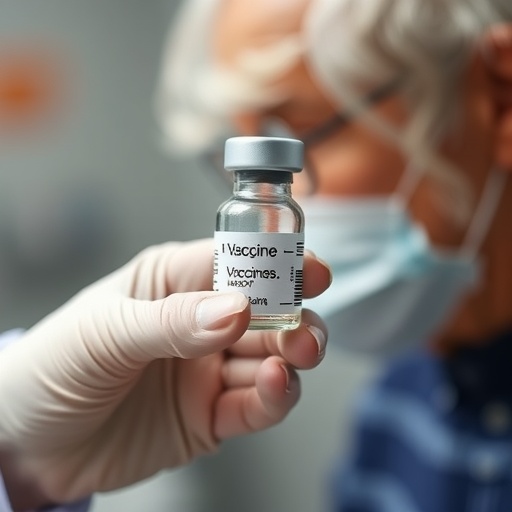A groundbreaking study recently published in JAMA highlights the remarkable efficacy of a single-dose respiratory syncytial virus (RSV) vaccine in protecting older adults against severe RSV-associated illness and hospitalization over two consecutive seasons. Conducted by the IVY Network, a multicenter hospital research consortium, this robust analysis offers critical insights into the durability of RSV vaccine protection, shaping future public health policies and clinical recommendations for at-risk populations aged 60 and above.
Respiratory syncytial virus remains a significant public health challenge, especially during the fall and winter months in the United States. Annually, RSV accounts for an estimated 100,000 to 150,000 hospital admissions and causes between 4,000 and 8,000 deaths among adults over 60 years old. These alarming statistics underscore the urgent need for preventative measures to mitigate the heavy clinical burden imposed by this common viral pathogen.
The study’s lead investigator, Dr. Wesley Self, MD, MPH, Senior Vice President for Clinical Research at Vanderbilt University Medical Center, emphasizes that the findings reinforce current recommendations for RSV vaccination in older populations. The research marks a pivotal step in understanding not only the immediate impact of vaccination but also the longevity of vaccine-induced immunity in this vulnerable age group.
Utilizing the IVY Network’s extensive surveillance infrastructure, researchers employed a test-negative, case-control study design, enrolling 6,958 individuals aged 60 years or older hospitalized for acute respiratory illness. These participants were drawn from 26 hospitals dispersed across 20 U.S. states, spanning two RSV seasons—from October 2023 through March 2024, and October 2024 through April 2025—allowing for a comprehensive temporal evaluation of vaccine effectiveness.
The data demonstrated that a single dose of the RSV vaccine reduced the risk of hospitalization by an impressive 58% overall across both seasons. Notably, the vaccine’s protective efficacy was highest during the first year post-vaccination, reaching 69%, before declining to 48% in the second year. These figures suggest a waning immune response over time, a finding consistent with immunosenescence and the naturally diminishing antibody titers observed in older adults.
Dr. Self elaborates on this phenomenon, pointing out the potential benefits of booster doses to prolong immunity and maintain clinical protection. “Our study indicates that while the RSV vaccine is highly effective initially, its effectiveness diminishes with time. Administering a second dose at an appropriate interval could sustain protection and reduce severe RSV outcomes in this population,” he noted. Monitoring vaccine durability will be crucial to inform future vaccination schedules and guidelines.
From a mechanistic perspective, RSV infection triggers complex host immune responses, including both humoral and cellular immunity components. The vaccine’s ability to elicit neutralizing antibodies targeting the viral fusion (F) protein plays a central role in preventing virus entry and replication in respiratory epithelial cells. However, age-related immune system decline necessitates ongoing evaluation of vaccine formulations and dosing regimens to maintain efficacy.
The study’s robust epidemiological design allowed precise measurement of vaccine impact amidst real-world conditions, capturing variability in viral circulation, patient comorbidities, and healthcare settings. This external validity strengthens confidence in the vaccine’s utility across diverse clinical environments and patient populations, offering a blueprint for broad-based immunization strategies targeting older adults.
Current public health guidance recommends RSV vaccination for all adults aged 75 years or older, as well as adults aged 60 to 74 years who possess heightened risk factors for severe disease, including chronic cardiopulmonary conditions, immunocompromise, or other significant comorbidities. This stratified approach aims to maximize protection for those most vulnerable to RSV-related complications.
In light of these promising findings, ongoing surveillance of vaccine effectiveness is essential. Future research should focus on optimizing booster timing, assessing long-term immunogenicity, and exploring next-generation vaccines capable of eliciting more durable protection. The implications extend beyond individual health, potentially alleviating seasonal burdens on healthcare systems and reducing overall mortality linked to RSV.
This study, funded by the Centers for Disease Control and Prevention (CDC), exemplifies the critical role of coordinated, multi-institutional research efforts in advancing respiratory virus prevention. It provides a scientific foundation for policymakers and clinicians to advocate for wider RSV vaccine uptake among older adults, ultimately mitigating the significant morbidity and mortality that RSV inflicts within this demographic.
The RSV vaccine’s demonstrated ability to prevent hospitalizations and critical illness represents a major advancement in respiratory infectious disease control. As vaccine platforms continue to evolve, the integration of this vaccination program into routine geriatric preventive care holds promise for improving health outcomes and enhancing quality of life for millions of older Americans each year.
Subject of Research: Effectiveness and durability of a single-dose RSV vaccine in adults aged 60 and older
Article Title: One shot of an RSV vaccine protects adults ages 60 or older from RSV-associated hospitalization and critical illness during two consecutive RSV seasons, according to a study published in JAMA today by the IVY Network research group.
News Publication Date: 30-Aug-2025
Web References: http://dx.doi.org/10.1001/jama.2025.15896
Image Credits: Vanderbilt University Medical Center
Keywords: Vaccination, Respiratory syncytial virus




